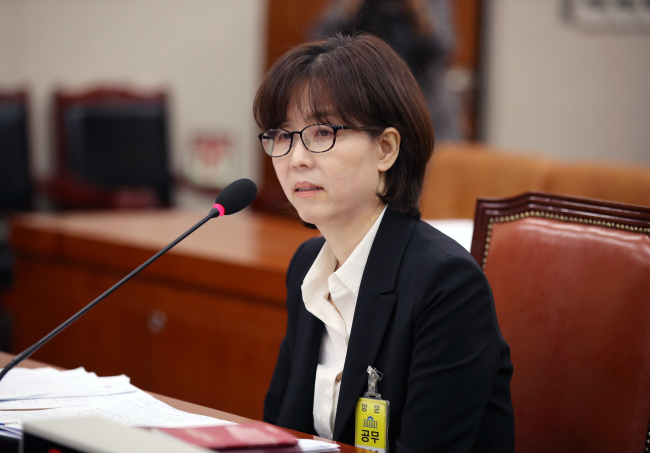Constitutional Court Justice nominee Lee Mi-sun was in the hot seat Thursday over stocks worth around 3.5 billion won ($3 million) she and her husband hold, igniting allegations of a possible conflict of interest.
The couple bought the stocks through 5,200 transactions -- 1,200 times by Lee and 4,000 times by her husband Oh Cheong-jin -- prompting financial authorities to look into alleged irregularities.
Lee claimed she was unaware of the scope of the transactions as stock trading was done by her husband.
Cheong Wa Dae’s nomination of Lee has also sparked further questions concerning its vetting process, as it had nominated a number of candidates who fell short of public standards in a recent Cabinet reshuffle.
After Wednesday’s hearing, opposition lawmakers raised suspicions against Lee and Oh, a former judge at Busan District Court and currently a lawyer at a law firm, for owning a large number of shares in a company involved in a case that he had presided over as a judge.
Of the couple’s total wealth of 4.06 billion won, the stocks account for 83 percent. Among the stocks, 67 percent is made up of equities of eTech E&C and Glasslock, affiliates of a local energy and chemical group OCI.
Raising a possible conflict of interest, opposition parties noted Lee had tried a case involving OCI as a witness while Oh was a judge in a trial involving the group.
“The ruling was neither in favor of nor disadvantageous to eTech E&C. I was not in a position to know insider information,” Lee said at Wednesday’s hearing.
She has a record of trading 67 stocks around 376 times while serving as a judge between 2013 and 2018.
 |
Constitutional Court Justice nominee Lee Mi-sun attends a confirmation hearing at the National Assembly on Wednesday. (Yonhap) |
Amid mounting allegations that the couple had leveraged their posts to trade stocks, financial authorities have stepped in to review their transactions.
“We have requested the Korea Exchange for an update to look into allegations raised during the hearing,” said an official of the Financial Services Commission.
Their stock ownership overshadowed Cheong Wa Dae’s reason for backing Lee as a nonmainstream Constitutional Court judge with an undergraduate degree from a university outside of Seoul and an expertise in labor law.
Rep. Choo Hye-sun of the minor Justice Party has criticized her nomination, saying, “Cheong Wa Dae’s stance regarding candidate Lee’s stock ownership is that it is not problematic because she did not profit from it. Zeroing in on profits shows the lax vetting process, which should instead have screened whether it (stock transactions) was related to her job.”
Echoing Choo’s view, Rep. Keum Tae-sup of the ruling Democratic Party said given his experience, he had learned that prosecutors and judges should not engage in stock trading due to their access to classified information.
Lee said she would unconditionally sell all the stocks if she appointment gets confirmed.
“Lee’s case should be viewed from an ethics stand point, rather than a legal point of view. Because the judiciary is held up to higher ethical standards, she and her husband should not have engaged in trading stocks related to trials they presided over,” said Park Sang-byung, a political commentator.
“We are seeing questionable candidates nominated due to a limited pool of persons who suit the administration’s ‘code.’”
By Kim Bo-gyung (
lisakim425@heraldcorp.com)








